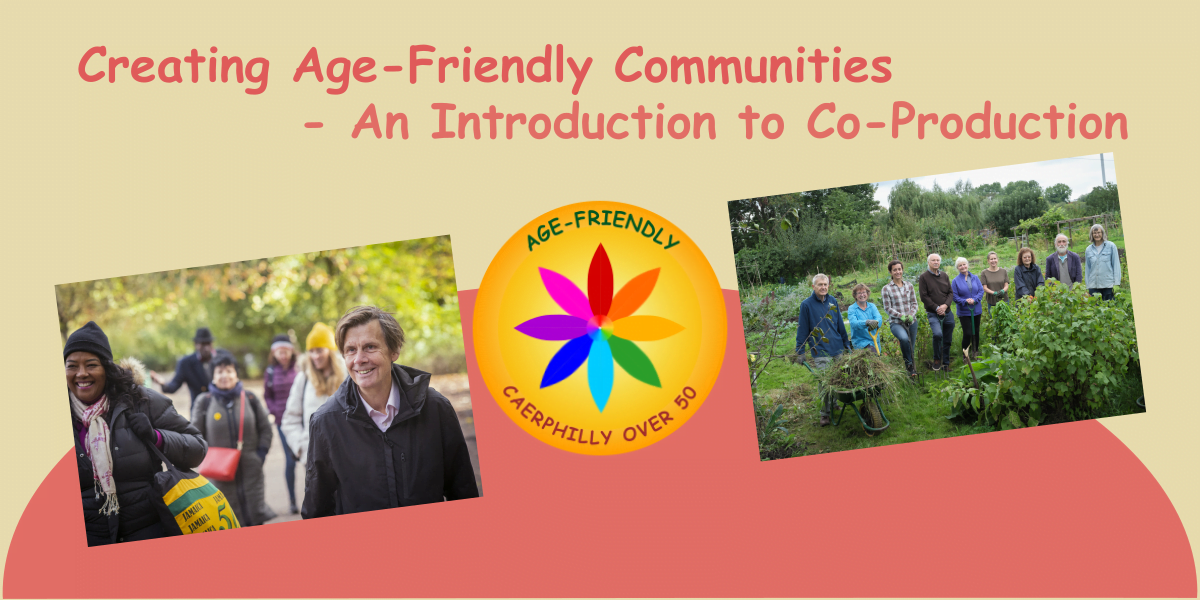Developing programmes for Age-Friendly Communities (AFCs) can help to address and improve the well-being of an ageing population. The World Health Organisation (WHO) takes care to point out that the Age-Friendly proves is a ‘journey’, not a defined state or endpoint.
The WHO place the responsibility for developing AFCs on Local Authorities. This is an interesting challenge for LAs like Caerphilly Council where many of the ‘services‘ are provided by Gwent. The development of the new Well-Being Plan is being conducted by Gwent PSB. So, Caerphilly will need to understand what interactions are possible with ‘partners’ such as the Health Board and Police.
The Well-Being Plan and elements of the Welsh Government’s Implementation Plan (that supports the latest Strategy for An Ageing Society) will have substantial content that meets Age-Friendly criteria. The management of these objectives and the role of the Caerphilly Age-Friendly Steering Group have still to be defined.
Participation of Older People
Involvement and participation of older people in all decisions and processes for creating age-friendly environments is the single most important principle.
The Age-Friendly principal moves away from the idea that planning and decision-making is conducted by professionals and politicians for older people. The intention is that older people are involved at the inception, defining the problem/opportunity. This greater involvement is defined by WHO:
Participation is a process by which people are enabled to become actively and genuinely involved in defining issues of concern to them, in making decisions about factors that affect their lives, in formulating and implementing policies, in planning, developing and delivering services and in taking action to achieve change.
WHO recognises that participation as described above will take time, effort, and commitment to effect. This is the essential step to achieving the change in culture.
The Social Services and Well-being (Wales) Act 2014
The Code of Practice (General Duties) of the 2014 Act sets out how local authorities must involve people in the co-production of the design and operation of services.
Involvement of People
(Section 237 of the Code of Practice)
There will be a range of ways of doing this, but essential to fulfilling this duty will be an approach which is based on co-production principles. By this, we mean an approach which:
- Recognises people as assets, and as having a positive contribution to make to the design and operation of services
- Supports and empowers people to get involved with the design and operation of services
- Empowers people to take responsibility for, and contribute to, their own well-being
- Ensures that practitioners work in partnership with people to achieve personal outcomes at an individual and service level
- Involves people in designing outcomes for services.
The Co-production Network for Wales says, ” co-production is when professionals work in partnership with people who have lived experience, to develop solutions to challenges in public services and communities”. We want to see older people and their representatives engaged productively from the outset, not by a process that sees older people as passive recipients or involves them when convenient or after key decisions have already been made. This will require public bodies to reassess their approach to engaging with older people so that they are involved in decision making as equal partners and that the independent and self-determined voice of older people is still heard and acted upon on a rights basis. Co-production must be meaningfully implemented both in principle and in practice.
Why is this important to us? The requirement for Local Authorities to produce their Well-Being plans followed the legislation for the Social Services and Well-being (Wales) Act 2014. It surely follows that Well-Being Plans, their creation and implementation, should involve older people from the outset, using the principles of co-production. The current Well-Being Plan (2018 – 2023) was produced by the Caerphilly Public Service Board (PSB). But subsequently the 5 County Boroughs of Gwent decided that the 2023 – 2028 Well-Being Plans would be produced by the Gwent PSB. A draft plan for Caerphilly is expected in October.

